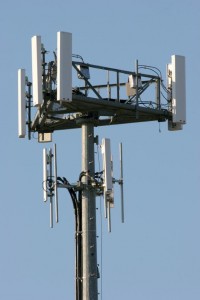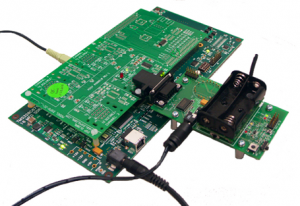 Current research in Communications at the SenSIP Center are in the areas of MIMO systems, multi-carrier systems including OFDM and CDMA, and cleaned equalization coding. The following publications includes some of the by the faculty members of the SenSIP center. We have included a primer on OFDM systems.
Current research in Communications at the SenSIP Center are in the areas of MIMO systems, multi-carrier systems including OFDM and CDMA, and cleaned equalization coding. The following publications includes some of the by the faculty members of the SenSIP center. We have included a primer on OFDM systems.
- Coding for MIMO Communication Systems (Book)
- OFDM Systems for Wireless Communication (Book)
- The Audacity of Fiber-Wireless (FiWi) Networks
- VMP: A MAC Protocol for FiWi Access Networks
 In the networking area, research is conducted in the areas of scheduling and security. Scheduling algorithms are designed to improve the performance of communication networks and smart-grids. Research in the network security area focuses on privacy-preserving methods for sensor networks and social networks as applied to mobile users.
In the networking area, research is conducted in the areas of scheduling and security. Scheduling algorithms are designed to improve the performance of communication networks and smart-grids. Research in the network security area focuses on privacy-preserving methods for sensor networks and social networks as applied to mobile users.
- Secure Top-k Query Processing via Untrusted Location-based Service Providers
- Fine-grained Private Matching for Proximity-based Mobile Social Networking
- Distributed Opportunistic Scheduling With Two-Level Probing
- Opportunistic Cooperative Networking: To Relay or Not To Relay?
 Wireless sensor networks are used for distributed estimation and distributed detection. Effects of wireless communication channels on the performance of these inference systems are quantified, in addition to the effect of multiple antennas. Estimation algorithms that exploit fixed transmit power and phase modulation are also developed, which allow robust estimation for low-latency and limited bandwidth applications such as health IT and security.
Wireless sensor networks are used for distributed estimation and distributed detection. Effects of wireless communication channels on the performance of these inference systems are quantified, in addition to the effect of multiple antennas. Estimation algorithms that exploit fixed transmit power and phase modulation are also developed, which allow robust estimation for low-latency and limited bandwidth applications such as health IT and security.
- Estimation Over Fading Channels With Limited Feedback Using Distributed Sensing
- Distributed Detection over Fading MACs with Multiple Antennas at the Fusion Center
- Distributed SNR Estimation using Constant Modulus Signaling over Gaussian Multiple-Access Channels
- Real-Time Acoustic Monitoring Using Wireless Sensor Motes